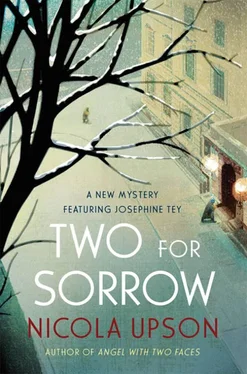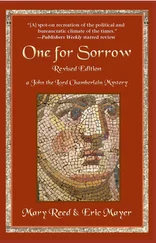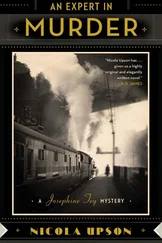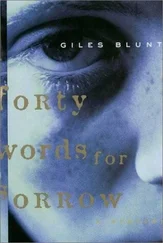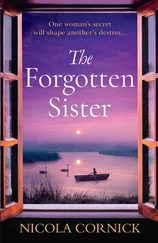The pavement was only just wide enough to accommodate a double flow of pedestrians, and Josephine walked on slowly, recognising herself in the women from provincial towns who seemed utterly engrossed in their business, determined not to miss a thing. It was after five o’clock and, in the last hour, the pinks and oranges of a winter sunset had quickly given way to a sky the colour of blue-black ink. An unbroken line of streetlights stretched ahead of her like pearls on a string, drifting into the distance and relieving the mile-long stretch of shops—ladies’ mile, as it was known—from the ordinariness of the day. Some of the smaller branches had already closed, emptying more workers out onto the streets, and a few shop-girls stopped to gaze wistfully into the windows of the larger stores, a long day on their feet having strengthened their desire to stand for once on the other side of the counter; most, though, headed quickly for the underground or for bus queues which grew longer by the second, muttering impatiently to themselves and keen to make every second of freedom count before the daily routine began again.
As impressive as its sequence of huge stores was, Oxford Street was one of Josephine’s least favourite parts of London, something to be endured for the sake of a weakness for clothes but never for longer than necessary. Gladly, she left its crowds and its clatter behind and cut through into the more select surroundings of Wigmore Street. There was something about the anonymity of walking through London in the early evening that never failed to delight her, a sense of freedom in the knowledge that—for as long as she chose—no one in the world knew where she was or how to contact her. She had travelled down from Inverness ten days ago, but had so far managed to keep her presence a secret from all but a few casual acquaintances at her club. It couldn’t last forever; there were several engagements booked for the following week and she would have to pick up the telephone soon and open a floodgate of invitations, but she was in no hurry to socialise before she had to. A world in which there were no timetables to be followed or deadlines to be met, and where messages left were never for her, suited Josephine perfectly. She was determined to enjoy it for as long as possible.
Even so, the sort of undemanding companionship offered by an afternoon of dedicated shopping was a relief after the solitary morning she had spent in her room—just her and a typewriter and a series of shadowy figures from a past which felt utterly alien to her. She was still not sure about the novel she was working on, and wondered if her desire to write something other than a detective story had been wise after all. When her editor suggested a book with a historical slant, a fictionalised account of a true crime seemed a good idea, particularly one with which she had a personal connection, but the claustrophobic horror of Holloway Gaol was starting to depress her and she had only just begun. Summer—both the real summer she had spent in Cornwall and the imaginary version which she had recently delivered to her publisher—seemed a long way away, and she found herself craving the warmth of the sun on her back and the comforting presence of Detective Inspector Alan Grant, hero of her first two mysteries. These early stages of a book, when all the characters were unfamiliar, were always the hardest to write. Getting to know them felt like walking into a room full of strangers, something from which her shyness made her recoil in horror; she would be pleased to get further on with the story, even if the world she was creating was unlikely to get any cheerier.
Across the street, the Times Book Club was still open and she was amused to see that books never failed to bring out the dormant shopper in a man. A lamp under the blind threw a welcoming yellow glow on to the shelves, where faded covers of popular novels and obscure political pamphlets were brought together as randomly as the people who browsed them. She considered going in, but decided that she was too laden with shopping to manage the sort of rummaging that books required, and pressed on instead to Cavendish Square. Here, the streetlamps were more forgiving, their pools of light interspersed with longer stretches of darkness, and there was a restful elegance about the area. The Square had been more fortunate than many of its London counterparts, where residential buildings were asked to rub along with modern offices, and it still consisted principally of beautifully proportioned old houses. It was home time and, as she made her way round to number 20, Josephine watched the lights coming on in the upper stories, imagining doors opening and voices calling up the stairs while life moved from the office to the sitting room.
The Cowdray Club occupied a particularly handsome eighteenth-century town house on the corner of Cavendish Square and Henrietta Street, at the heart of what was once the most fashionable area of Georgian England. The house had been bought from Lord Asquith—the latest in a line of distinguished owners—and, in 1922, established as a social club for nurses and professional women by Annie, Viscountess Cowdray. Lady Cowdray—whom Josephine had never met but who had been, by all accounts, a formidable fundraiser and loyal supporter—had also paid for a new College of Nursing headquarters to be built in Asquith’s old garden; thanks to some ingenious architectural thinking, the two buildings now functioned happily together, one providing for a nurse’s working needs and the other for her rest and relaxation. Just over half of the Cowdray Club’s membership came from the nursing profession. The rest were from all walks of life—lawyers, journalists, actresses and shop-girls, attracted by stimulating conversation, comfortable surroundings and the cheapest lunches in town—and Josephine was pleased to call it home whenever she wanted her time in London to be private and free from obligations to friends. Since Lady Cowdray’s death a little over three years ago, the members had not lived together quite as harmoniously as the buildings: nursing was a political profession, and those left to run the club in its founder’s absence had different views on its priorities and future. It was the same when any natural leader died or moved on, she supposed, but things were bound to settle eventually; in the meantime, she kept her head down and tried to avoid the bickering.
Outside the main entrance, she balanced her parcels precariously on one arm but the door flew open before she could reach it, and a young woman—one of the club’s servants—rushed out, nearly knocking her to the ground.
‘Am I missing the fire?’ Josephine asked, a little more sarcastically than she meant to.
‘Crikey, Miss—I’m so sorry,’ the girl said, bending down to pick up the boxes that had skidded across the pavement and into the street. ‘I wasn’t looking where I was going.’
‘Obviously,’ Josephine said, but softened as she noticed how upset the girl seemed. ‘I don’t suppose there’s any harm done. None of this is breakable.’ She held out her hand to take the last of the parcels. ‘What’s the rush, though? Is everything all right?’
‘Oh yes, Miss. It’s just that I’m on my break and I don’t get long. I’m already late to meet someone.’
‘Even so, surely you’ve got time to go back for your coat?’ She looked at the thin cotton dress and pinafore which all the club’s housemaids wore. ‘It’s November—you’ll catch your death going out like that.’
‘I’m all right, Miss, and I’d rather get off. To tell the truth, I’m not supposed to use this entrance but it’s so much quicker than going out the side door and all the way round. That’s why I was in such a hurry—Miss Timpson on reception was showing someone through to the bar, so I nipped out the front while she wasn’t looking.’ She glanced across to the Square, then turned back to Josephine. ‘I’d be ever so grateful if you didn’t say anything, Miss, and I’m fine—honestly. I won’t be out here long.’
Читать дальше
